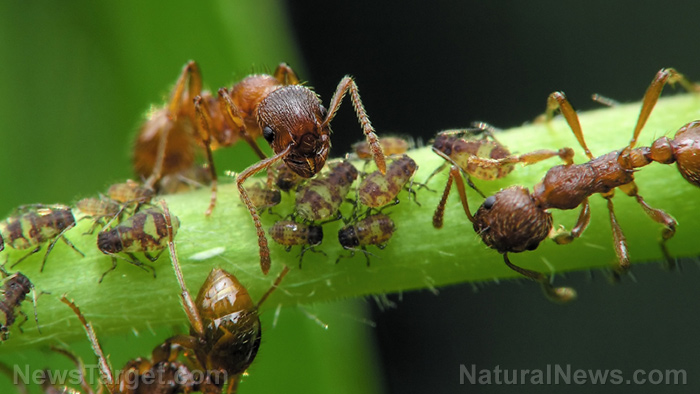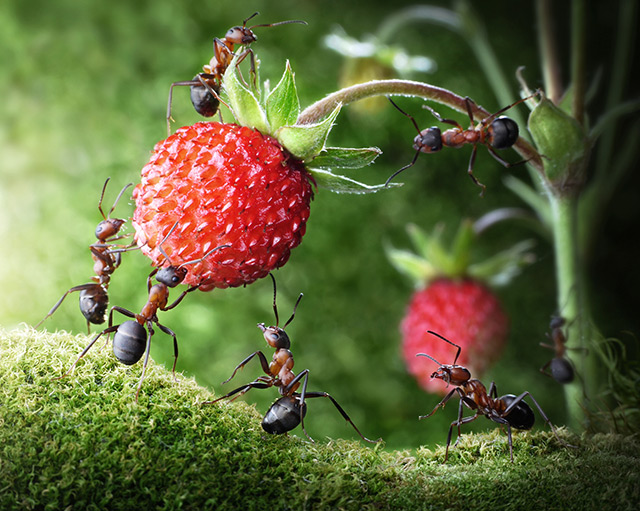
The idea of eating insects might make some people lose their appetites, but there are actually plenty of bugs you can safely eat when SHTF. Here are the top 12 insects and creepy-crawlies you can use as survival food. (h/t to SurvivalSullivan.com)
Ants
Chocolate-covered ants are considered a delicacy in some parts of the world. In a survival scenario, you may have to make do with eating them raw once they are dead. You can also boil them for around six minutes to neutralize the acid in their bodies and reduce their sour taste.
Crickets
As a rich source of protein, crickets are among the most commonly eaten insects in the world. However, they should always be cooked first before eating since raw crickets may carry nematodes. Once cooked, remove the antennae, legs, and head for easy consumption. (Related: 5 Compelling Reasons You Should Eat More Insects (Especially Crickets).)
Wood lice
Also called "potato bugs" or "pill bugs," wood lice are actually not bugs, but a type of crustacean. Boil the wood lice thoroughly to eliminate any parasites, then strain the water out and eat. Boiled wood lice have a flavor similar to shrimp.
Stinkbugs
While you should generally avoid eating foul-smelling bugs, stinkbugs are an exception. Cooked stinkbugs are enjoyed as a delicacy in Mexico, where they hold an annual festival to celebrate these odiferous bugs. Before cooking stinkbugs, soak them in water for five to 10 minutes. You can then thoroughly roast them in a dry pan until they are dead. Their exotic flavor can taste either like iodine or apples, depending on how they are cooked.
Grubs
Grubs often refer to the larval stage of beetles. While fully mature beetles are also edible, grubs are highly nutritious and taste similar to roasted nuts. Depending on what type of grub you can find in your local area, they can either be small and crunchy or fat and juicy. You can cook your grubs by skewering them lengthwise on a long stick and roasting them until crispy or crunchy.
Termites
As a survival food, termites can provide you with plenty of healthy fats and protein. You can find them almost anywhere that you can find wood. Once you have your termites, you can roast them in a dry pan until they are crispy. You might expect termites to taste like wood, but they actually have a minty or nutty flavor.
Earthworms
Earthworms may not be bugs, but they are edible. Before eating them you must first remove their stomach contents by squeezing them from one end to the other. This lowers your risk of accidentally consuming any parasites, chemicals, or other contaminants. You can technically eat earthworms raw after stripping them of their stomach contents, but earthworms are best eaten boiled or roasted. They can even be dried or ground into a fine powder.
Earwigs
Since earwigs have no stingers or venom, they are perfectly edible and safe to eat. They do have an intimidating pair of pincers at the ends of their bodies, but they usually won't hurt or break your skin if you use your bare hands to catch them. Earwigs are best eaten sauteed.
Aphids
Aphids are tiny insects that live on a variety of plants, particularly those that have a sweet sap. Simply take a leaf that's swarming with aphids and brush the critters into a container full of water. You can then directly boil them in the water. Depending on what plants they feed on, aphids can taste anywhere from bitter to sweet.
Dragonflies
Both adult dragonflies and larvae can be eaten. You can pull off their wings and legs before roasting or frying them for a few seconds.
Maggots
Maggots might resemble grubs, but they are actually quite different. Maggots refer to the larval stage of flies. They are usually much thinner and they have no legs. Maggots might not be the tastiest survival food, but they can sustain you when SHTF. Make sure to boil or saute them thoroughly before eating them to eliminate any harmful pathogens.
Cockroaches
Considering how filthy they can be, cockroaches should be your last resort when searching for survival food. Clean the roaches thoroughly before removing their heads, antennae, and legs. Boil them for at least 10 minutes before eating them.
Learn more ways of living off the land at Survival.news.
Sources include:
Please contact us for more information.



















